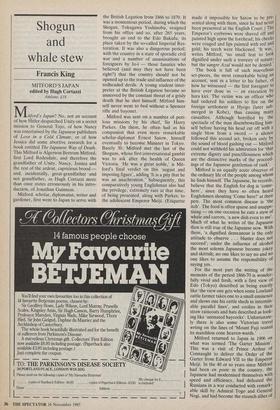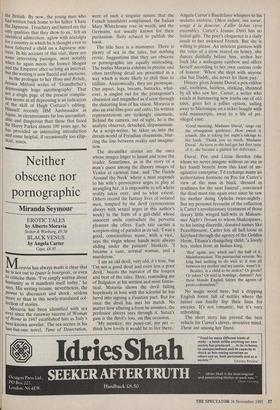Shogun and whale stew
Francis King
MITFORD'S JAPAN edited by Hugh Cortazzi
Athlone, £18
Mitford's Japan? No, not an account of how Hitler despatched Unity on a secret mission to General Tojo, of how Nancy was entertained by the Japanese publishers of Love in a Cold Climate, or of how Jessica did some abortive research for a book entitled The Japanese Way of Death. This Mitford is Algernon Bertram Mitford, first Lord Redesdale, and therefore the grandfather of Unity, Nancy, Jessica and the rest of the ardent, capricious brood and, incidentally, great-grandfather and not grandfather, as Hugh Cortazzi more than once states erroneously in his intro- duction, of Jonathan Guinness.
Mitford, scholar, diplomatist, writer and gardener, first went to Japan to serve with the British Legation from 1866 to 1870. It was a momentous period, during which the Shogun, Tokugawa Yoshinobu, resigned from his office and so, after 265 years, brought an end to the Edo Bakufu, its place taken by the so-called Imperial Res- toration. It was also a dangerous period, with the country in a state of sporadic civil war and a number of assassinations of foreigners by Jo-i — those fanatics who believed (and may they not have been right?) that the country should not be opened up to the trade and influence of the redheaded devils. A young student inter- preter at the British Legation became so unnerved by the constant threat of a grisly death that he shot himself. Mitford him- self never went to bed without a Spencer rifle and bayonet.
Mitford was sent on a number of peri- lous missions by his chief, Sir Harry Parkes. On them, he often had as his companion that even more remarkable scholar-diplomat Ernest Satow, himself eventually to become Minister in Tokyo. Barely 30, Mitford met the last of the Shoguns, whose first conversational gambit was to ask after the health of Queen Victoria. 'He was a great noble,' is Mit- ford's final verdict on this 'august and imposing figure', adding 'It is a pity that he was an anachronism.' Subsequently, this comparatively young Englishman also had the privilege, extremely rare at that time, of being presented, along with Parkes, to the adolescent Emperor Meiji. (Etiquette
made it impossible for Satow to be pre- sented along with them, since he had never been presented at the English Court.) The Emperor's eyebrows were shaved off and painted high upon the forehead; his cheeks were rouged and lips painted with red and gold; his teech were blackened. 'It was, writes Mitford, 'no small feat to look dignified under such a travesty of nature but the sangre Azul would not be denied. The book is full of such marvellous set-pieces, the most remarkable being an account, sent in a letter to his father, of how he witnessed — the first foreigner to have ever done so — an execution by hara kiri. The victim was an officer who had ordered his soldiers to fire on the foreign settlement at Hyogo (later sub- merged in Kobe), thus causing many casualties. Although horrified by the spectacle of the man disembowelling him- self before having his head cut off with a single blow from a sword — a silence followed this second act, broken only by the sound of blood gushing out — Mitford could not withhold his admiration for 'that extreme dignity and punctiliousness which are the distinctive marks of the proceed- ings of the Japanese gentleman of rank'.
Mitford is an equally acute observer of the ordinary life of the people among whom he finds himself. The Japanese, he records, believe that the English for dog is 'come- here', since they have so often heard Englishmen shouting 'Come here!' at their pets. The most common disease is 'the itch'. The food is often sparse and unappe- tising — on one occasion he eats a stew of whale and carrots, 'a new dish even to me'. Much of what he writes of the Japanese then is still true of the Japanese now. With them, 'a dignified demeanour is the only attitude to observe . . . bluster does not succeed'; under the influence of alcohol the most solemn Japanese become jokey and skittish; no one likes to say no and no one likes to assume the responsibility of saying yes.
For the most part the writing of the memoirs of the period 1866-70 is wonder- fully vivid and fresh, with a first view of Edo (Tokyo) described as being exactly like 'the view one gets when some Lowland cattle farmer takes one to a small eminence and shows one his cattle sheds in intermin- able parallel lines', and coolies in their straw raincoats and hats described as look- ing like 'animated haycocks'. Unfortunate- ly there is also some Victorian travel wrting on the lines of 'Mount Fuji reared its matchless cone heaven-wards.'
Mitford returned to Japan in 1906 On what was termed 'The Garter Mission'. This was a visit of Prince Arthur of Connaught to deliver the Order of the Garter from Edward VII to the Emperor Meiji. In the 40 or so years since Mitford had been en poste in the country, the Japanese had modernised themselves with speed and efficiency, had defeated the Russians in a war conducted with remark- able skill by Admiral Togo and General Nogi, and had become the staunch allies of the British. By now, the young man who had written back home to his father 'I hate the Japanese. Treachery and hatred are the only qualities that they show to us,' felt an uncritical admiration, aglow with nostalgia for a country in which he is thought even to have fathered a child on a Japanese mis- tress. In his account of this visit, there are some interesting passages, most notably when he again meets the former Shogun and the Emperor after so long an interval; but the writing is now flaccid and unctuous. In the prologue to her Hans and Rebels, Jessica Mitford writes of 'Grandfather's depressingly huge autobiography'. That not a single page of the present compila- tion seems at all depressing is an indication of the skill of Hugh Cortazzi's editing. Himself recently HM Ambassador in Japan, in circumstances far less uncomfort- able and dangerous than those that faced Sir Harry Parkes almost 100 years ago, he has provided an interesting introduction and some helpful, if occasionally too ellip- tical, notes.



































































 Previous page
Previous page